 Do you really need
a pesticide?
Do you really need
a pesticide?
 Which pesticide
will meet your need?
Which pesticide
will meet your need?
 Which pesticide is
best for your situation?
Which pesticide is
best for your situation?
 Good cultural
practices will help reduce the need for pesticides.
Good cultural
practices will help reduce the need for pesticides.
Healthy plants are less susceptible to attack by pests, and good cultural
practices can reduce pest outbreaks
Before you purchase any pesticide, you should answer some important
questions...
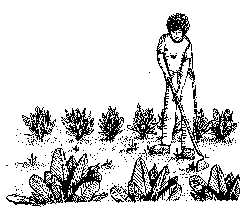
-
Is the damage actually being caused by a pest? Could it be the weather or
a cultural practice, such as over- or underwatering, fertilizer, or herbicide
damage, etc.)?
-
If it is a pest, what kind is it? Insect? Disease? Animal? Rodent?
-
Are there non-chemical ways to control it? Is the damage severe enough to
warrant chemical control?
-
Is pesticide use cost-effective? Or would the chemical treatment cost more
than the plant is worth?
-
Can the pest be controlled by a chemical at this stage of its life cycle,
or would application at a different time be more effective?
Remember, just because you see insects does not mean that insects are a
problem. Proper identification of the problem is essential before you select any
type of control. There are many excellent resources available to help you
identify pests or pest caused problems, including trained professionals at
nurseries and garden centers, your local Extension office, and reference books
dealing with plant pests and diseases.
Return to Table of Contents
If you determine a pesticide is needed, read the pesticide labels carefully.
You must choose a product that is specifically labeled for use on the plants you
wish to protect and effective against the pest you want to control. Never use a
pesticide on a food-bearing plant unless the label directs such use. The general
term pesticide includes insecticides, fungicides, herbicides, rodenticides, etc.
You must determine which product is appropriate to combat your problem. For
example, an insecticide is effective only against insect pests, and some
insecticides target only a certain type of insect. An insecticide alone will not
solve a weed or disease problem, but some pesticide products contain two or more
active ingredients; for instance, a formulation for rose care can contain an
insecticide and a fungicide.
Return to Table of Contents
Avoid problems by taking the time to carefully study your pesticide needs.
Your local Extension agent or a certified nursery employee can help with
pesticide recommendations, as well as help you tailor the application to the
site intended. Personal and environmental safety are prime concerns.
Consider the site. Read the label of each product under consideration to be
sure that it can be used in the place and the manner you intend. For example, if
the label indicates that the material is toxic to fish, do not use it on plants
along the border of a pond. If the label requires that you wait two weeks from
the time that you spray until you harvest, it should not be used on vegetables
or fruits that are almost ripe. Consider all uses of the site to which the
pesticide will be applied and protect children, pets, and wildlife by careful
pesticide selection and use.
What application equipment and personal protective equipment does the label
require? Do you have the gear? If not, are you willing to purchase, use, and
maintain it? Do you want a pesticide that must be mixed and loaded into a
sprayer, or will a pre-mixed, "ready-to-use" product in a spray bottle be more
appropriate to your needs?
Minimize waste. You should purchase only the amount of pesticide you
anticipate using in one season. Most pesticides have a limited shelf life. If
pesticides are stored, they must be protected from extreme heat and cold, and
must be kept in a secure, locked place. Read the storage section of the product
label prior to purchase, and do not buy a product that you can't store as
directed. Also, remember that pesticides must be kept in their original
container with the label intact.
Choose the least toxic product. Compare pesticides based on how hazardous
they are. The signal word on the label indicates a product's toxicity. For
example, products marked CAUTION are less toxic than those marked WARNING, and
should be considered first.
Environmental hazards are reported on the label. Be especially cautious with
pesticides containing warnings regarding impact on water.
Carefully read the disposal directions. Be sure you can properly dispose of
any unused or unwanted pesticide and the pesticide's container according to the
manufacturer's recommended method.
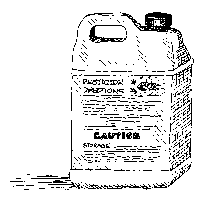 If all else is equal, compare the
cost per unit of active ingredient before making your final selection.
If all else is equal, compare the
cost per unit of active ingredient before making your final selection.
IMPORTANT!
If you must use a pesticide, read the label carefully to be sure that it is
intended for use on the type of plant you wish to protect, to control the type
of pest you've identified Pesticide users are legally bound to follow label
directions. You should read a pesticide label thoroughly before purchase. before
each use, and prior to storage or disposal.
Return to Table of Contents
To keep your plants healthy use the following guidelines:
-
Select plants adapted or native to your area.
-
Control weeds - use mulches and hand-pulling where possible.
-
Water adequately - overwatering and underwatering can be equally damaging.
-
Do not crowd plants - planting too close weakens plants and increases
disease.
-
Fertilize properly - inadequate fertilization causes weak plants
susceptible to insects and disease; too much fertilizer can damage plants and
pollute ground water.
-
Add organic matter such as compost to the soil - rich soil leads to
healthier plants.
-
Control pests before they become established - hand-remove insects or
diseased leaves as soon as you see them.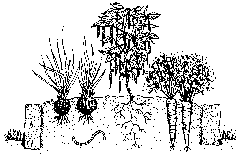
Pesticides can be valuable gardening tools, but they must be selected with
personal and environmental safety in mind. As with other tools, it is important
to use the right pesticide for the job. Care and planning before pesticides are
purchased can ensure safe and proper use.
Return to Table of Contents
![]() Gardeners' Corner
Kids'
Garden
Sustainable Garden
Contact Us
Gardeners' Corner
Kids'
Garden
Sustainable Garden
Contact Us![]()

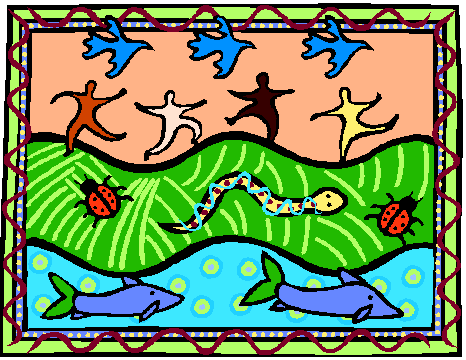
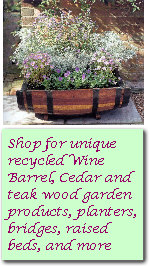

 If all else is equal, compare the
cost per unit of active ingredient before making your final selection.
If all else is equal, compare the
cost per unit of active ingredient before making your final selection. 